For an updated screenings list, please go to:
www.wgfilm.com/english/productions/productions/bananas »
Festival Résistances
Foix, France
2011.07.08 – 2011.07.16
Sembrando Cine
Peru
2011.06.15 – 2011.06.21
GA Alma et Chicoutimi-Nord
Alma, Quebec, Canada
2011.05.14
Park Slope Food Coop
Brooklyn, US
2011.05.10
Maysles Cinema (sneak preview)
Harlem, New York
2011.05.09
Kino Xenix
Zürich, Schweiz
2011.05.08 – 2011.05.29
Festival Economia
Trento/Roveto
2011.05.04
Cinema Politica
Truro, Canada
2011.05.02
Moviemento
Linz, Austria
2011.04.29
Food & Film
Savona, Italy
2011.04.20
Cinema Politica
Windsor, Canada
2011.04.07
Cinema Politica
Truru, NS, Canada
2011.04.04
Food Film Festival
Amsterdam, Netherlands
2011.03.18 – 2011.03.20
Rassegna di cinema documentario al Baretti
Torino, Italy
2011.03.16
Festival Internacional de Cine de Punta del Este
Uruguay
2011.03.13 – 2011.03.21
Agenda 21
Åland
2011.03.05
San Francisco Green Film Festival
San Francisco, USA
2011.03.03 – 2011.03.06
Kino im kesselhaus
Krems, Austria
2011.03.02
Cartagena International Film Festival
Catagena, Colombia
2011.02.24 – 2011.03.03
Worldbridger Film Series
Vancouver, US
2011.02.23 – 2011.02.24
Måndagsdokumentären
Copenhagen, Denmark
2011.02.21
Biblioteket, Hörsalen
Ängelholm, Sverige
2011.02.14
The International Student Festival
Trondheim, Norway
2011.02.11 – 2011.02.20
Cinema Politica, Mount Allison University
Sackville, NB, Canada
2011.02.07
Husie Medborgarkontor
Malmö, Sweden
2011.02.02
Memorial University
Newfoundland and Labrador, Canada
2011.02.02
Kriterion
Amsterdam, The Netherlands
2011.01.30
Agenda 21, Cafe Bönan
Mariehamn, Åland
2011.01.27
Frontline Club
London, UK
2011.01.24
Austrian Theatrical release
Vienna, Linz
2011.01.21
UCLA
Los Angeles, USA
2011.01.19
ORF2 (Television)
Austria
2011.01.16
Top Kino Matinée
Vienna, Austria
2011.01.15
Top Kino
Vienna, Austria
2011.01.14
Scandinavia House
New York, USA
2010.11.17 – 2010.11.20
Nordox, Nordic Documentary Film Festival
Beijing, China
2010.11.13 – 2010.11.25
Tutti nello stesso piatto
International Food, Film & Videodiversity Festival
Trento, Italy
2010.11.10 – 2010.12.10
The screening room at the Mercury Cinema
Adelaide, Australia
2010.11.03
American Scandinavian Foundation
New York, USA
2010.11.03
Ad Hoc: Inconvenient Films Human Rights Film Festival
Vilnius, Lithuania
2010.10.23 – 2010.11.09
DOCSDF International Film Festival
Mexico
2010.10.21 – 2010.10.31
Latinamerikagruppen
Eskilstuna, Sweden
2010.10.20
Saint Michaels College
Colchester, VT, USA
2010.10.16
Alianza Francesa
Managua, Nicaragua
2010.10.06 – 2010.10.07
Internazionale a Ferrara Festival
Rome, Italy
2010.10.01 – 2010.10.10
Task Force on Americas
Marin County, CA, USA
2010.10.01
Criterio Ambiental
Costa Rica
2010.09.25 – 2010.10.01
Casa Canadiense
Toronto, Canada
2010.09.18
Matsalu Nature Film Festival
Lihula, Estonia
2010.09.15 – 2010.09.19
Kinogalerija
Rīga, Latvija
2010.09.11 – 2010.09.12
INZG In Zagreb Festival
Zagreb, Croatia
2010.09.10 – 2010.09.11
DMZ Korean International Documentary Festival
Swedish Embassy, Seoul, South Korea
2010.09.09 – 2010.09.13
VIVISECTfest
Novi Sad, Serbia
2010.09.07 – 2010.09.11
Chungmuro International Film Festival
South Korea
2010.09.02 – 2010.09.10
Baltic Sea Forum
Latvia
2010.09.02 – 2010.09.12
Melbourne Interantional Film Festival
Melbourne, Australia
2010.07.22 – 2010.08.08
Letizia Onlus project "June a month for Nicaragua"
Rome, Italy
2010.06.30
The Chapter Cardiff
Canton, UK
June 28 – July 1, 2010
Downtown Independent
Los Angeles, USA
June 23, 2010
Ecofilms – Rodοs International Films + Visual Arts Festival
Rodos, Greece
June 22-27, 2010
FICA International Film Festival
Goiânia, Brasil
June 8-13, 2010
Edinburgh Filmhouse
Edinburgh, UK
June 7-10, 2010
Berkshire International Film Festival
Massachusetts, USA
June 3-7, 2010
Transilvania International Film Festival
Transilvania, Romania
May 28 – June 6, 2010
Real Earth Environmental Film Festival
New Zealand
May 22, 2010
Encontro Internacional de Capoeira
Angola Montpellier, Brazil
May 14-16, 2010
Dalhousie University
Halifax, Nova Scotia, Canada
May 13, 2010
Karlstor-Kino
Heidelberg, Germany
May 12, 2010
Victoria Film Festival
Victoria, CA, USA
May 8, 2010
Biograf Spegeln
Malmö, Sweden
May 8, 2010
"Let’s go BANANAS!*"
Bio Rio, Stockholm, Sweden
May 8, 2010
DOXA Documentary Film Festival
Vancouver, Canada
May 7-16, 2010
7 Planete Doc Review Film Festival
Warsaw, Poland
May 7-16, 2010
Wehrenberg Theatres, Rochester
Maine, USA,
May 4, 2010
Swedish cinema screenings, winter 2009-2010:
Norsborg, Dec 3
Lund, Kino, Dec 12 (with director visit)
Göteborg, Haga, Dec 11-17, March 1, April 22
Stockholm, Zita, Dec 15
Gislaved, Filmstudion, Jan 25
Kristianstad, Filmmuséet, Feb 07
Vetlanda, Saga, Feb 25
Järfälla, Folkets hus Kallhäll, Mar 22
Upplands Väsby, Centrumbiografen, Mar 23
Halmstad, Röda Kvarn, Filmstudion, Mar 25
Norrköping, Bio Harlekinen, April 1
Malmö, Spegeln, April 5-18
International Documentary Film Festival DOCVILLE
Leuven, Belgium
May 1-8, 2010
Boston Independent Film Festival
Boston, USA
April 21-28, 2010
Institute of Contemporary Arts
London, UK
April 16-25, 2010
Visions du Réel Film Festival
Nyon, Switzerland
April 15-21, 2010
Norsk filminstitutt: Cinemateket
Oslo, Norway
April 14, 2010
Yale Environmental Film Festival
New Haven, United States
April 6-11, 2010
International Human Rights Documentary Film Festival
Kiew, Ukraine
Mar 26 – Apr 2, 2010
Skövde Dokumentärfilmsfestival
Skövde, Sweden
March 25-28, 2010
Cleveland International Film Festival
Cleveland, OH, United States
March 18-28, 2010
LA69 Casa de cultura
Mérida Yucatán, Mexico
March 25, 2010
Thessaloniki International Film Festival
Thessaloniki, Greece
March 12-21, 2010
One World International Film Festival
Prag, Czech Republic
March 10-18, 2010
Cinema Planeta
Cuernavaca, Mexico
March 5-14, 2010
Vera Filmfestival
Mariehamn, Åland
March 7, 2010
Washington DC Independent Film & Music Festival
Washington DC, United States
March 4-14, 2010
Dunkers kulturhus (Eko-dagarna)
(With director visit)
Helsingborg, Sweden
Febrary 26-27, 2010
Caligari FilmBuehne Wiesbaden
Wiesbaden, Germany
February 24, 2010
Ystad Församling – Film i Fastan
Ystad, Sweden
February 21, 2010
Medioteket
Stockholm, Sweden
February 08-26, 2010
Berlinale International Film Festival
Berlin, Germany
February 11-21, 2010
This human world
Vienna, Austria
December 3-13, 2009
Bratislava International Film Festival
Bratislava, Slovenia
Nov 27 – Dec 4, 2009
Oslo International Film Festival
Oslo, Norway
November 19-29
Nordox Nordic Documentary Film Festival
Beijing, China
Nov 14 – Dec 6, 2009
IDFA International Documentary Film Festival
Amsterdam, Netherlands
November 19-29, 2009
Festival Européen des 4 écrans
Paris, France
November 18-20, 2009
Aarhus Filmfestival Aarhus
Aarhus, Denmark
November 12-15, 2009
(BANANAS!* screens at the kick-off on Sunday, November 8th!)
RIDM – Rencontres internationales du documentaire
Montreal, Canada
November 11-21, 2009
Sevilla Festival de Cine Europeo
(In competition)
Sevilla, Spain
November 6-14, 2009
CPH:DOX
Copenhagen, Denmark
November 6-15, 2009
Leeds International Film Festival
Leeds, UK
November 4-22, 2009
Ung Forum
Lund, Sweden
October 30, 2009
M:DOX Film Festival
Malmö, Sweden
October 23-25, 2009
Mostra Internacional de Cinema
Sao Paulo, Brazil
Oct 23 – Nov 5, 2009
CMJ Music Marathon & Film Festival
New York, USA
October 20-24, 2009
Dramatiska institutet
Stockholm, Sweden
October 19, 2009
Swedish premiere, October 2009:
Båstad, Scala, Oct 9
Fagersta, Folkets hus, Oct 9
Gusum, Folkan bio, Oct 9
Göteborg, Roy, Oct 9
Göteborg, Haga, Oct 30
Haparanda, Folkets hus, Oct 9
Järfälla, Folkets hus Kallhäll, Oct 9
Karlstad, Arenan, Oct 26-27
Kumla, Folkan, Oct 11
Lidköping, Folkets hus, Oct 23
Lund, Kino, Oct 9
Malmö, Spegeln, Oct 9
Mörrum, Bio Laxen, Oct 9
Norrköping, Harlekinen, Oct 18 & 25
Nynäshamn, Folkets hus, Oct 9
Osby, Bio Borgen, Oct 9
Skärhamn, Saga, Oct 9
Skoghall, Folkets hus, Oct 9
Stockholm, Rio, Oct 9
Stockholm, Zita, Oct 9
Söråker, Folkets hus, Oct 14
Tomelilla, Brösarps bio, Oct 9
Trollhättan, Forum/Folkets hus, Oct 9
Uppsala, Fyris, Oct 9 (no broadcast)
Umeå, Folkets bio, Oct 16
Västerås, Elektra, Oct 9
Växjö, Palladium, Oct 22
Ånge, Folkets hus, Oct 9
Åseda, Folkets hus, Oct 9
Älmhult, Folkan, Oct 13
Örebro, Roxy, Oct 9
Östersund, Regina, Oct 9 (no broadcast)
Doc Lounge screenings:
Göteborg, Sweden, Oct 7
Oulu, Finland, Oct 7
Stockholm, Sweden, Oct 6
Malmö, Sweden, Oct 5
Tampere, Finland, Oct 1
Helsinki, Finland, Sep 25
BANANAS!* gala premiere
Malmö, Sweden
Royal, October 8, 2009
Nordisk Panorama
Reykjavik, Iceland
September 28, 2009
Malmö Filmdagar
Malmö, Sweden
August 24-27, 2009
Folkets hus och parkers Filmdagar
Piteå, Sweden
August 13-16, 2009
Film i Båstad
Båstad, Sweden
August 1, 2009
Los Angeles Film Festival
California, USA
June 18-28, 2009
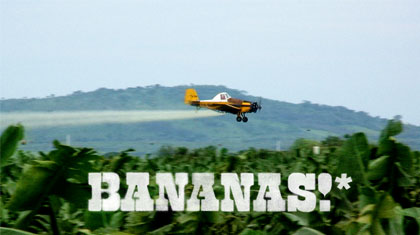
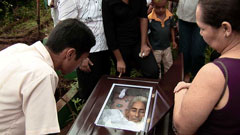
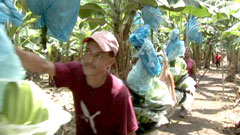
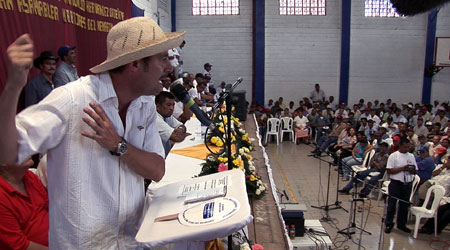

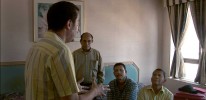

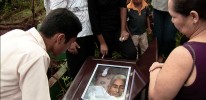
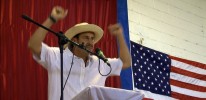








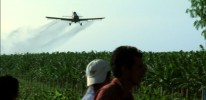
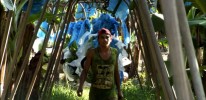

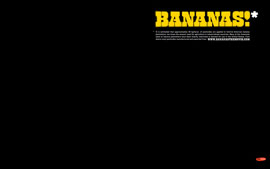


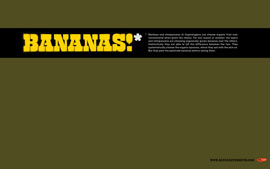

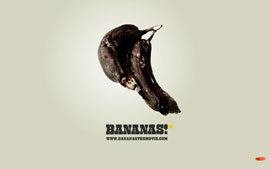

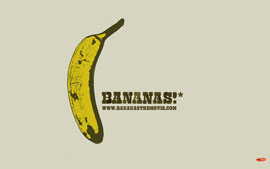
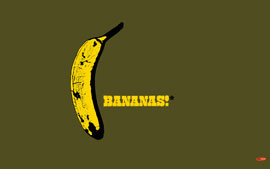
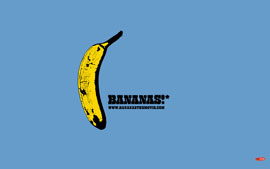

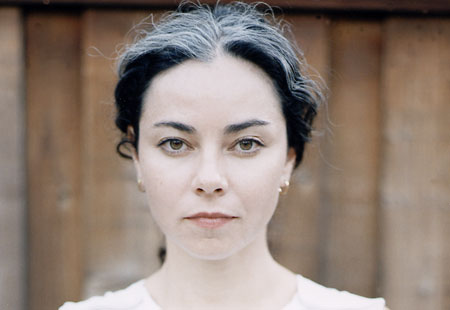 Rebeca Méndez
Rebeca Méndez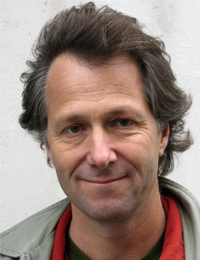 Filmmaker & producer at WG film, Sweden. Fredrik Gertten speaks fluent Spanish and has worked as a journalist in Nicaragua in the eighties and nineties.
Filmmaker & producer at WG film, Sweden. Fredrik Gertten speaks fluent Spanish and has worked as a journalist in Nicaragua in the eighties and nineties.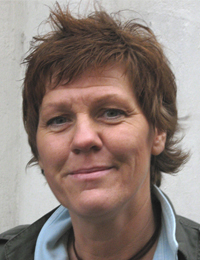 Employed at WG Film since six years as producer. Has been in the media business for 20 years. Worked as freelance film worker for some years, at SVT Drama and commercial/information films. EAVE graduate 2005.
Employed at WG Film since six years as producer. Has been in the media business for 20 years. Worked as freelance film worker for some years, at SVT Drama and commercial/information films. EAVE graduate 2005.